STATEHOUSE REPORT | ISSUE 21.09 | MARCH 4, 2022
BIG STORY: Grassroots groups organize against bills that limit teaching of history
NEWS BRIEFS: Early voting bill gets unanimous House approval
LOWCOUNTRY, Ariail: Meddling
COMMENTARY, Brack: It’s sad how trust in government has eroded
SPOTLIGHT: Conservation Voters of South Carolina
OUR TURN: Ideas to fix S.C.’s housing costs
FEEDBACK: Send us your thoughts
MYSTERY PHOTO: Lots of bricks
Grassroots groups organize against bills limiting of history teaching

By Herb Frazier | A grassroots coalition of civil rights and education groups are preparing for next week’s third round of hearings in a S.C. House committee on five so-called critical race theory (CRT) bills that would squash the teaching of history if it includes sex, race and slavery.
The hearings in the House Committee on Education and Public Works will resume March 8. Committee chair Rep. Rita Allison, R-Lyman, said Thursday she wanted all of the committee’s 17 members to attend the final of three hearings. “I want everyone to hear the same thing,” she said.
At 11 a.m. March 8 before the hearings continue, the ACLU of South Carolina is scheduled to hold a press conference outside of the Statehouse, said Joshua Malkin, a public interest and government fellow with the organization.
Bills would have broad impact
If the bills become law, they would also ban classroom discussions that ethnicity, religion, color, or national origin is inherently superior or inferior. A CRT bill is also up for debate in the S.C. Senate.
But Malkin added South Carolinians don’t understand the broad scope of the bills and the implications beyond public education.
“A lot of the conversation has focused on the K-12 classrooms,” he said. “But a number of bills also target public and private universities and any entity that receives funding from the General Assembly. Nonprofits and businesses that receive (state) benefits are also implicated. And a few of the bills attack the LGBTQ community in a rather horrific way.”

The ACLU, the NAACP Legal Defense Fund and the Lowcountry Black Parents Association are part of a group forged by the Charleston-based E3 Foundation to educate the public about the bills. Opponents have held online strategy sessions, recruited supporters, and prepped parents and others to testify before lawmakers, said E3 co-founder LaTisha Vaughn.
“Our focus is to ensure that history is taught transparently and truthfully,” she said. “These bills would limit what teachers can say and what is taught in classrooms. In one of the bills, there is a hotline if parents feel history is being taught in the wrong way. That is not something we support.”
E3’s co-founder Audrey K. Starks Lane of Charleston,told lawmakers that she received an incomplete history lesson as a child. She said she was in her 30s when she heard about the Orangeburg Massacre. Three South Carolina State University students were shot and killed by police in 1968 while protesting against a segregated bowling alley.

“There are children who want to know more, and I’m not just talking about Black children,” Lane said, according to The Post and Courier. “They want to know what has happened in this state because it helps them when they’re interacting with each other.”
On Wednesday, the mother of a student testified she was concerned after discovering recently that her child had access to a book about sexuality and gender through a reading app on the school Chromebook. She said the book, “This Book is Gay,” was pornographic. “When you’re talking about inclusivity and tolerance, you run the risk of becoming too tolerant,” she said.
Republican sponsors of the bills have defined their objections under the broad heading of critical race theory, a legal theory to explain systemic racism in American society. It is not a subject taught in South Carolina schools, opponents of the bills argued. But CRT is being used as a catch-all phrase to deride a spectrum of issues dealing with gender, race and sex, they said.
“Parents are concerned about limiting the history that is taught in the classroom and feel it is an assault on black and brown people in particular,” Vaughn said. “Banning books is a key part of a few of the bills, and has been implemented in other states. The books that are listed as potentially being banned are all books which offer a diverse perspective or experience of people of color.”
Herb Frazier is special projects editor at the Charleston City Paper.
- Have a comment? Send to: feedback@statehousereport.com.
Early voting bill gets unanimous House approval
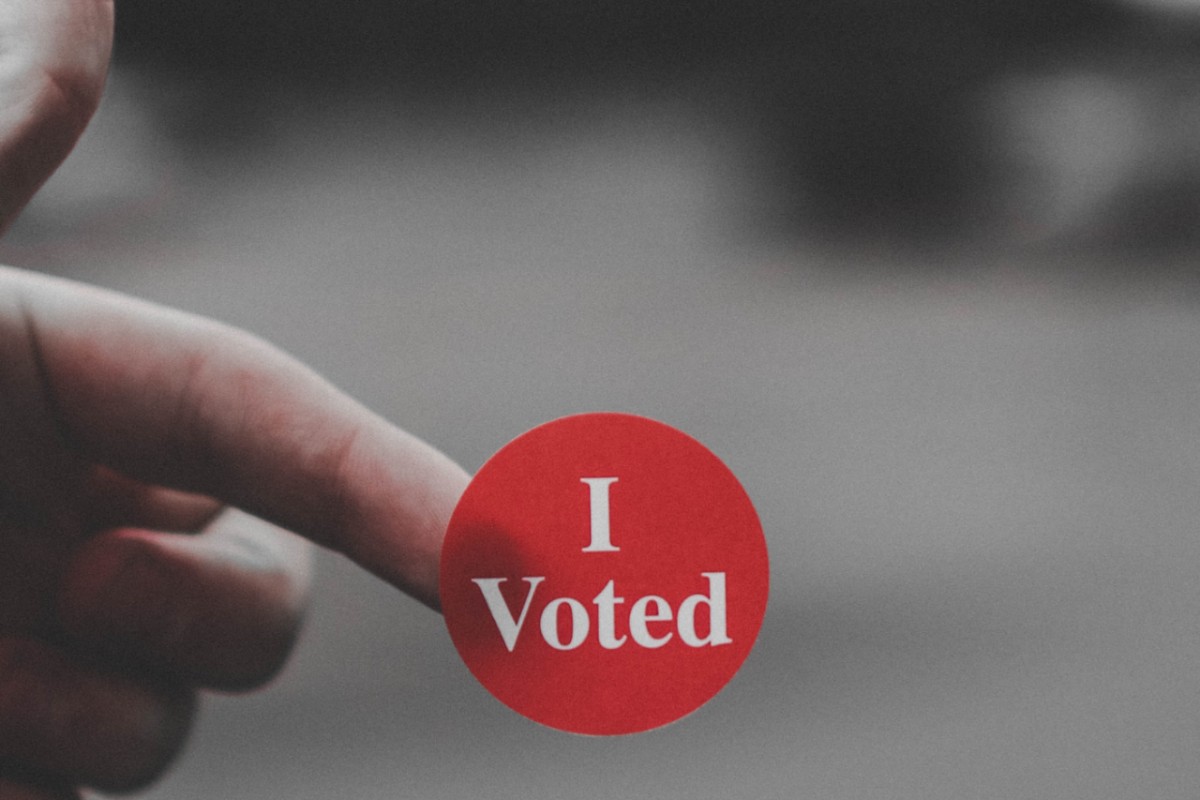
Staff reports | The S.C. House unanimously passed a bill Wednesday that allows two weeks of early voting and other tweaks to state election laws. The bill now heads to the state Senate.
The bill earned praise from Democrats and Republicans alike on the House floor before being passed 110-0. If the bill is passed into law, South Carolina would become the 45th state to allow voters to cast ballots outside of Election Day without an excuse.
The state already allows absentee voting, but voters are asked to provide an excuse as to why they can’t be at the polls on Election Day.
In other recent news:
![]() Hutto, Senn force delay of abortion bills. S.C. Sens. Brad Hutto, D-Orangeburg, and Sandy Senn, R-Charleston, staged a walkout from a committee hearing, delaying two abortion-related bills, including one that would ban all abortions in South Carolina if the U.S. Supreme Court says states can do so. Meanwhile, the Idaho Senate approved a GOP bill to ban abortion at six weeks while the Florida Senate passed a similar bill banning abortion at 15 weeks.
Hutto, Senn force delay of abortion bills. S.C. Sens. Brad Hutto, D-Orangeburg, and Sandy Senn, R-Charleston, staged a walkout from a committee hearing, delaying two abortion-related bills, including one that would ban all abortions in South Carolina if the U.S. Supreme Court says states can do so. Meanwhile, the Idaho Senate approved a GOP bill to ban abortion at six weeks while the Florida Senate passed a similar bill banning abortion at 15 weeks.
S.C. Senate moves forward bill to break up S.C. health agency. South Carolina senators are set to consider a proposal to break up the state’s health and environmental affairs agency into two separate departments.
Senate bill would give every S.C. taxpayer $100 rebate minimum. All income tax filers in South Carolina — even the more than 1 million people who pay no state income tax — would get a rebate check of at least $100 in a bill being considered by the state Senate.
S.C. teacher vacancies highest in 20 years, data show. South Carolina’s teacher shortage is worsening, according to new numbers by the Center for Educator Recruitment, Retention and Advancement. There were 1,121 teacher vacancies in South Carolina as of February. That’s up from the 1,033 vacancies reported in the fall, which at the time was the most vacancies the state had in 20 years.
2022 elections in S.C. likely to use maps passed by lawmakers. Possible federal trials over whether South Carolina’s new election districts discriminate against Black voters have been delayed several months, making it likely the new maps will be used for elections this year.
State Senate OKs new floating holiday. The state Senate has approved a new floating state holiday that would allow state employees to take off Juneteenth — or any other day — instead of Confederate Memorial Day. The proposal, which would cost no state money, now heads to the S.C. House. According to the Associated Press, “Juneteenth commemorates June 19, 1865, when Union soldiers told enslaved Black people in Galveston, Texas, that they were free. It was two months after the Confederacy surrendered and more than two years after the signing of the Emancipation Proclamation.”
Charleston church shooter appeals to U.S. Supreme Court. The attorneys for convicted Charleston church shooter Dylann Roof have asked the U.S. Supreme Court to decide how to handle client-attorney disagreements over mental illness-related evidence. During the trial over the 2015 racist massacre at the Emanuel AME Church, Roof represented himself at times and sought to block any evidence portraying him as mentally ill, especially during his death penalty trial.
Trump to hold S.C. rally in March; McMaster to attend. Former President Donald Trump will hold a rally March 12 at the Florence airport in an effort to bolster campaigns for congressional Republican challengers state Rep. Russell Fry, R-Horry, running against U.S. Rep. Tom Rice, and Katie Arrington, running against U.S. Rep. Nancy Mace. Gov. Henry McMaster said Monday that he will attend Trump’s rally. McMaster has been an early supporter of Trump.
U.S. Marine jet crashes on Sanford’s family property near Beaufort. A U.S. Marine Corps fighter jet crashed Thursday on former S.C. Gov. Mark Sanford’s family property near Beaufort. The pilot and co-pilot, who were aboard the plane that had just taken off from the nearby air station, were both uninjured.
- Want more headlines every business day that are like this? Visit our friends at SC Clips.
Meddling

Cartoonist Robert Ariail often interprets things a little differently, but always has an interesting take on what’s going on in South Carolina. Love the cartoon? Hate it? What do you think: feedback@statehousereport.com.
It’s sad how trust in government has eroded

By Andy Brack, editor and publisher | If you use an accountant to help you do your taxes, do you tell the accountant what the tax law is? No, you rely on his or her expertise to guide you through the process so you’ll save money and comply with the intricate machinations of the federal tax code.
 If you go to a restaurant, do you go into the kitchen before a chef cooks your meal and tell her how to do it? No, you rely on her knowledge and experience to prepare it the way she sees fit. And if you don’t like it? You don’t return to the restaurant.
If you go to a restaurant, do you go into the kitchen before a chef cooks your meal and tell her how to do it? No, you rely on her knowledge and experience to prepare it the way she sees fit. And if you don’t like it? You don’t return to the restaurant.
“I don’t think there’s ever been a conversation before somebody’s cut my hair and that could have disastrous consequences,” one person quipped earlier this week.
Do you tell a lawyer how to practice law or a doctor exactly how to treat your cancer? What about farmers – do you go to their farms and tell them how to grow the food you eat? As your house burns, do you stop a firefighter and ask his qualifications to put out the fire?
All of these situations seem absurd. Except these days when it comes to some elected officials. In a time when too many everyday citizens can turn to the internet to spout their instant expertise on everything from how to treat COVID-19 to Russian geopolitics, it’s not surprising state lawmakers think they know better than our teachers on how to teach history.
But it’s sad. This is what we’ve come to when discussing issues: Nobody really seems to trust anyone any more.
It’s sad to read how a Charleston teacher this week had to ask members of a House committee to back off on so-called “critical race theory” legislation that would limit how they can teach history or discuss current events – even though South Carolina’s schools don’t use this non-curriculum theory to guide lessons.
It’s simply the fear among conservatives – and perhaps the scent in the air of yet another way to divide people politically – that they could use an obscure legal theory to whip up a storm of people getting worked up about how teachers teach students about race.
In South Carolina. A former slave state. With a racist past. Where Black slaves once outnumbered white residents. Go figure.
“I’m here to ask you to trust the system,” teacher Patrick Martin is reported to have testified earlier in the week at a S.C. House hearing on five bills related to critical race theory. “Trust teachers. Trust students. And trust parents.”
According to a 2021 report from Gallup, just 24 percent of Americans believe they can trust our government to do what’s right “just about always” or “most of the time.”
“Low levels of confidence in government … suggest that increased trust in government could have mitigated the impact of COVID in the U.S. – and, in theory, could do so in the future,” the Gallup report noted, highlighting how unvaccinated Americans have a much lower trust level than those who were inoculated.
A 2021 Pew Research Center survey was even more disturbing as it reflected a clear partisan divide on trust in government. Just 9 percent of Republicans and Republican-leaning independents said they trusted the government to do what’s right always or most of the time with Joe Biden as president. When Donald Trump was president, only 12 percent of Democrats felt the same way. The trust percentage for each party was about three times higher if a president was in the same party.
For South Carolina and America to work, we actually do have to trust the system. Let’s stop the legislative grandstanding on how we teach race to South Carolina students and focus on real issues like reducing poverty, improving health care, offering more opportunities and bettering our long-term quality of life.
Andy Brack, editor and publisher of Statehouse Report, also is publisher of the Charleston City Paper. Have a comment? Send to: feedback@statehousereport.com.
Conservation Voters of South Carolina
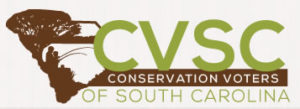 The Conservation Voters of South Carolina is a statewide nonprofit organization that fights for the Palmetto State’s air, water, land and energy through political action. The organization is bipartisan, pragmatic and effective.
The Conservation Voters of South Carolina is a statewide nonprofit organization that fights for the Palmetto State’s air, water, land and energy through political action. The organization is bipartisan, pragmatic and effective.
Through scorecards and advocacy at the Statehouse, CVSC holds South Carolina legislators accountable for their votes and actions. As a small organization that operates as a nonprofit and has a political action committee, we have a big impact. Learn more today by clicking any of the links below:
- CVSC Legislative Scorecards
- CVSC Issues
- CVSC News
- How to take action with CVSC
Ideas to fix S.C.’s housing costs
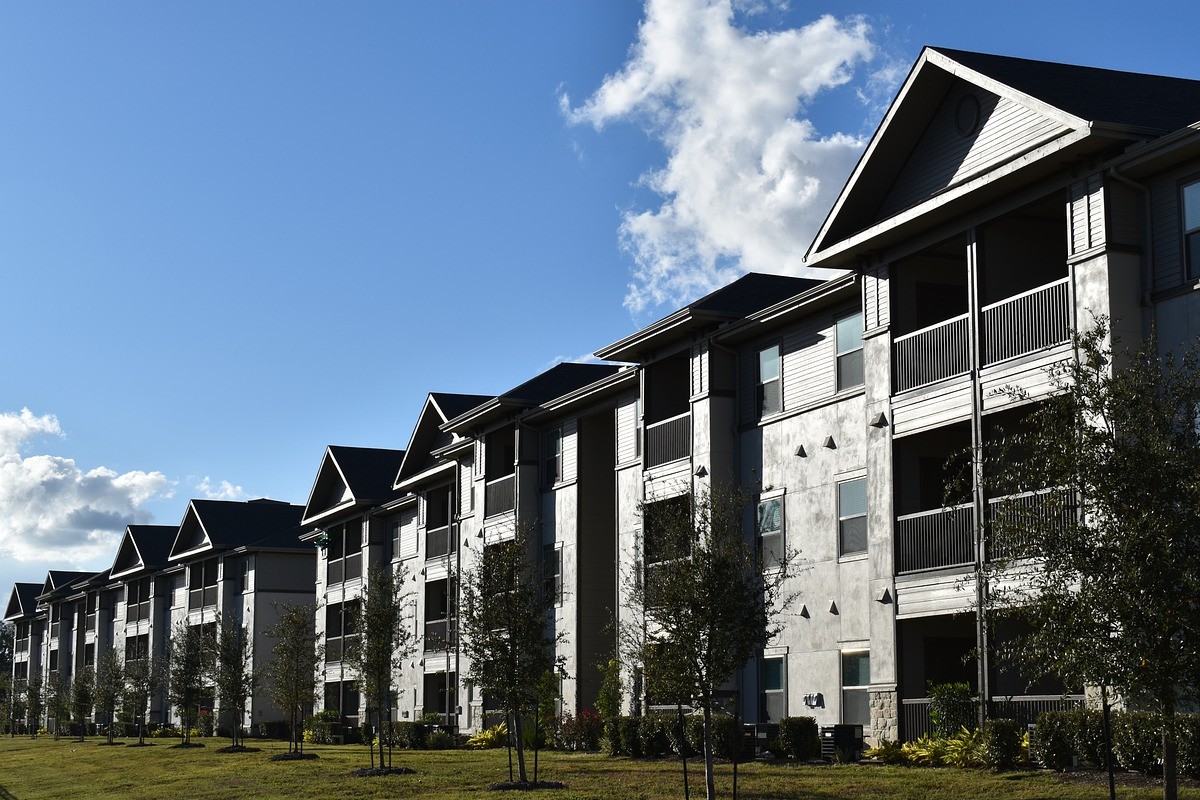
By S.C. Reps. Marvin Pendarvis and Jermaine Johnson Sr. | “The hits just keep on coming!” DJs used to say, meaning they’d play one great song after another, but lately that phrase has taken on new meaning. Now, we’re getting hit by one crisis after another. When we think we are beating the pandemic, new variants emerge. When the economy starts rebounding, inflation levels rock us again, and worsen a crisis of affordability.


That crisis is especially felt in housing. Though the overall cost of living in South Carolina is almost 8% below the national average, in 40 out of our 46 counties the average resident can’t afford a two-bedroom apartment. Even more troubling is that 24% of renters statewide spend more than half their annual income on housing.
Despite receiving $271 million from the federal government, South Carolina disbursed less than a quarter of that money. Only $69 million had been distributed to roughly 14,000 households. That comes out to less than $5,000 per household. But most people who desperately need this money haven’t received a dime. And for those who have, that relief is only temporary.
This problem is only getting worse. The counties we represent, Charleston and Richland, have already exhausted all federal funds allocated to help renters. Without further assistance, many will be unable to pay their bills and could face homelessness. Meanwhile, South Carolina has the highest number of evictions nationwide. In 2019, landlords evicted renters at a rate seven times the national average.
For too many people, it’s clear the status quo is broken. To fix this problem, we need to address the affordability crisis renters face, whether by building more affordable housing or changing the rental process. We’re proud to support proposals like inclusionary zoning, making it easier to increase affordable housing stock. We’ve also supported economic opportunity zones in low-income areas, and programs to help veterans, the formerly incarcerated, and more. These are good steps, but we can do more.
One obstacle to affordable housing for many is the upfront cash security deposit, which significantly increases the cost of moving. That can be a big challenge for many South Carolinians. One option to solve this that’s working across the country is low-cost security deposit insurance, like that offered by Rhino, where renters take out an insurance policy for as little as a few dollars each month. Solutions like security deposit insurance make it easier to move without the significant upfront costs that come along with renting.
Options like security deposit insurance make good fiscal sense as well. Traditional cash deposits tend to sit unused and it’s estimated that there’s between $255 million and almost $300 million sitting idly in escrow accounts statewide. Unlocking this money could help continue the economic boom that is making the Palmetto State one of the fastest growing states in America. We’re urging property owners to offer this alternative to renters for the simple reason that it makes renting more affordable while protecting landlords against unpaid rent and excessive damages.
We could all use a break from the seemingly never-ending hits. Our renters deserve better. They deserve affordable housing. They deserve stability. They deserve to provide a good life for their family. It’s time to get serious about not only investing in more affordable housing stock, but implementing housing policies that benefit all South Carolinians. So, it’s time to get to work for the people of South Carolina and improve our housing situation not just for the few, but for everyone.
Pendarvis, D-North Charleston, and Johnson, D-Hopkins, are members of the S.C. House of Representatives.
Send us your thoughts
We receive a few comments a week and look forward to publishing. But often we can’t because we can’t verify the identity of the writer. To be published, you’ve got to provide us with contact information so we can verify your letters. Verified letters to the editor are published weekly. We reserve the right to edit for length and clarity. Comments are limited to 250 words or less. Please include your name and contact information.
- Send your letters or comments to: feedback@statehousereport.com
Lots of bricks
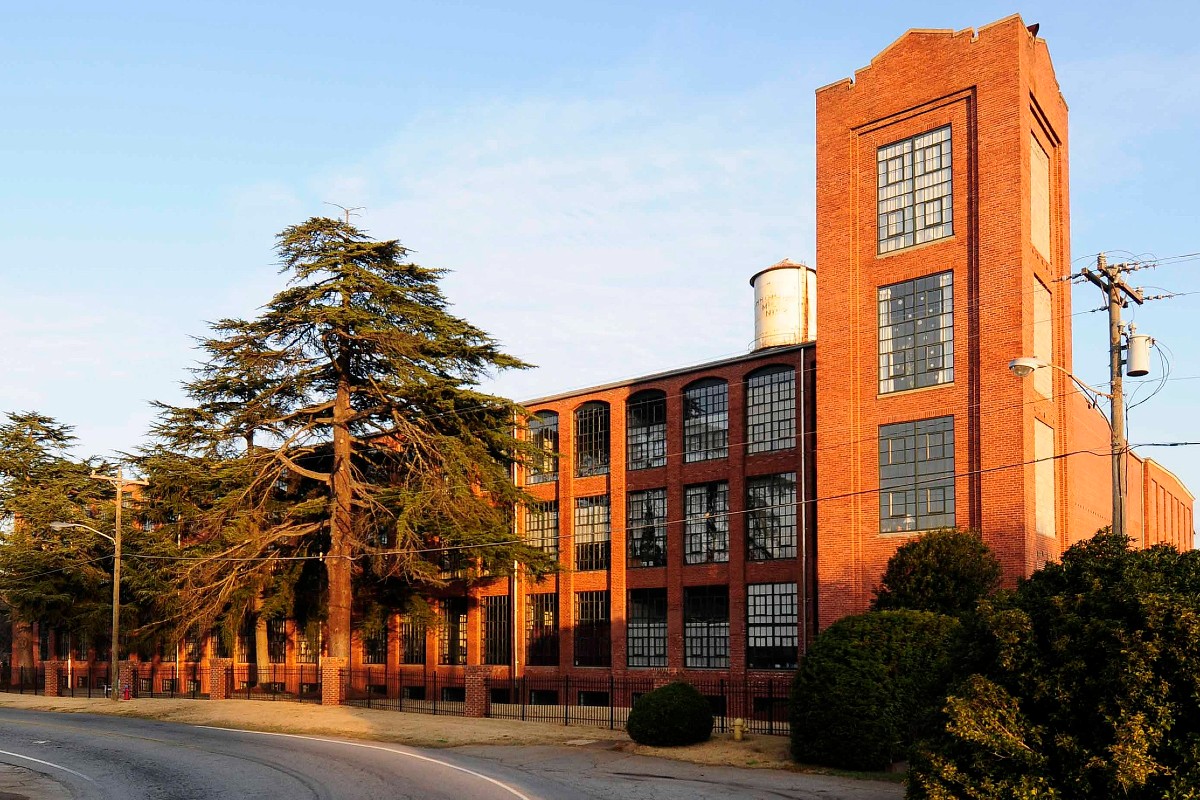
Lots of bricks were used to build this South Carolina structure. Where and what is it? Send your guess to feedback@statehousereport.com — and remember to include your name, home city and contact information.
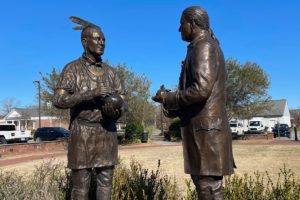 Last week’s mystery, “Statuary,” shows Native American leader King Hagler with Col. Joseph Kershaw in a small, hidden public square in Camden, S.C. The photo was taken by Barry Wingard of Florence.
Last week’s mystery, “Statuary,” shows Native American leader King Hagler with Col. Joseph Kershaw in a small, hidden public square in Camden, S.C. The photo was taken by Barry Wingard of Florence.
Congratulations to these readers who solved the weekly mystery: George Graf of Palmyra, Va.; Elizabeth Jones and Jay Altman, both of Columbia; Steve Willis of Lancaster; Robert Ariail of Camden; Jacie Godfrey of Florence; Bill Segars of Hartsville; Pat Keadle of Wagener; Allan Peel of San Antonio, Texas; David Lupo of Mount Pleasant; and Frank Bouknight of Summerville.
Peel shared that Hagler (c.1700–1763) “was a chief of the Catawba Native American tribe from 1754 to 1763. He is often referred to as the ‘Patron Saint of Camden, South Carolina’ as he was instrumental in helping Colonel Joseph Kershaw (1727-1791) successfully fight off the French during the French and Indian War of the 1750s. The statues were unveiled in October 2012.”
Jones shared that the pair “were early defenders of peace and liberty in the early founding of Camden, Kershaw County. They were war buddies who otherwise played well with others.”
- Send us a mystery. If you have a photo that you believe will stump readers, send it along (but make sure to tell us what it is because it may stump us too!) Send to: feedback@statehousereport.com and mark it as a photo submission. Thanks.
- ORDER NOW: Copies are in Lowcountry-area bookstores now, but if you can’t swing by, you can order a copy online today.
- Now available as an e-book!
ABOUT STATEHOUSE REPORT
Statehouse Report, founded in 2001 as a weekly legislative forecast that informs readers about what is going to happen in South Carolina politics and policy, is provided to you at no charge every Friday.
- Editor and publisher: Andy Brack, 843.670.3996
Donate today
We’re proud to offer Statehouse Report for free. For more than a dozen years, we’ve been the go-to place for insightful independent policy and political news and views in the Palmetto State. And we love it as much as you do.
But now, we can use your help. If you’ve been thinking of contributing to Statehouse Report over the years, now would be a great time to contribute as we deal with the crisis. In advance, thank you.
Buy the book
Now you can get a copy of editor and publisher Andy Brack’s We Can Do Better, South Carolina! ($14.99) as a paperback or as a Kindle book ($7.99). . The book of essays offers incisive commentaries by editor and publisher Andy Brack on the American South, the common good, vexing problems for the Palmetto State and interesting South Carolina leaders.
More
- Mailing address: Send inquiries by mail to: P.O. Box 21942, Charleston, SC 29413
- Subscriptions are free: Click to subscribe.
- We hope you’ll keep receiving the great news and information from Statehouse Report, but if you need to unsubscribe, go to the bottom of the weekly email issue and follow the instructions.
- Read our sister publication: Charleston City Paper (every Wednesday in print; Every day online)
- © 2022, Statehouse Report, a publication of City Paper Publishing, LLC. All rights reserved.















 We Can Do Better, South Carolina!
We Can Do Better, South Carolina!